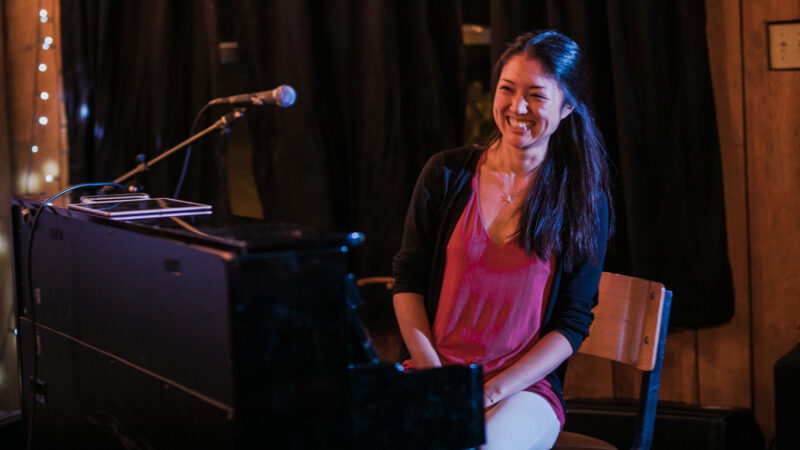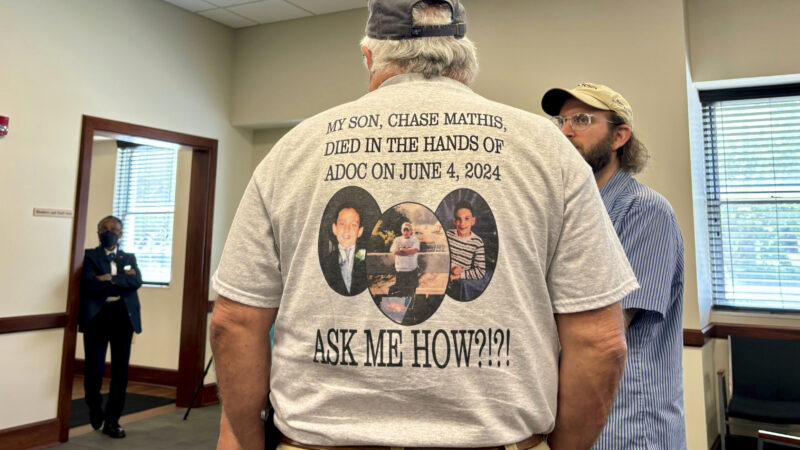How a pianist is using classical music to bridge divides in Alabama
By Kelsey Shelton, Reflect Alabama Fellow
For some people, classical music can be an unapproachable genre. Classically trained concert pianist, Miki Sawada, is aware of the impression classical music can impart on listeners. She has prestigious places on her resume including Yale University and Carnegie Hall.
“It can come with a lot of baggage with who it’s associated with. Traditionally, for example, we play a lot of music by white dead men from Europe. But classical music now, in 2023, is so much more than that,” she said.
The 2016 election sparked a change in her. The country was divided, and that division led her to an unlikely place – a U-Haul rental facility. She loaded an out-of-tune piano onto a van. Then she set out on a tour hoping to connect Americans using classical music.
“I think a lot of people’s reaction was to kind of ‘other’ the other people that were on the other side of the political spectrum or living in ways they weren’t familiar with,” Sawada said.
Sawada embarked on her Gather Hear tour in 2017. She planned to travel across all 50 states, performing classical music concerts for free in community gathering spaces rather than concert halls. She’s played at homeless shelters, churches, parks and nursing homes. She has toured five states so far. Alabama is her sixth. Her intention is to thoroughly explore every state, especially cities that don’t receive as much coverage.
“Instead of pushing people who are different from me away from me, I thought maybe I could use music as a way to truly get to know people in this country all across the socioeconomic and political divide,” she said.
For her shows in Alabama, she wanted to visit communities that are most in need of live music. Many are under-resourced and in rural areas. She also included incarcerated people with a performance at Staton Correctional Facility.
“As I found out in Louisiana, incarceration is a big issue in these states, Louisiana, Alabama. And I understand that so many people end up in prisons potentially for unjust reasons. I didn’t want to exclude that population from my tour because I’m really trying to reach everyone that represents Alabama,” she said.
Many locations where Sawada played are in majority Black communities. With that in mind, her set list features Black composers Florence Price, George Walker and William Grant Still. The pieces are paired with poetry by Alabama poets. She also has arrangements of African-American spirituals.
“Programmatically, I guess this time what feels most pertinent to me is that I’m finishing the whole program with ‘Deep River,’ which is, of course, singing about freedom on the other side of the Jordan River,” Sawada said.
She’s performed the spiritual at varying locations, from Japanese internment camp sites to underfunded Native American reservations. Though the song was written about freedom from slavery, it has remained relevant for a diverse group of people. She said it feels even more relevant now, during the Israel-Hamas conflict.
“Since I started the tour in 2017, the country has changed. I’ve changed as a person and performer. So the content of the show always tries to reflect what’s going on in the moment,” she said. “I definitely think about everything that’s happening currently while I’m on the tour. Because this tour is really like a living, breathing thing.”
That’s because Sawada is documenting the tour through video, blogs and social media. The tour’s website and YouTube channel are dedicated to highlighting the intimate moments she has shared with strangers. One show in Louisiana, ended with a duet of Amazing Grace with an unhoused person. In Marion, Alabama, Performances included young ballerinas.
“The documentation is almost as important as the in-person performance, because I wanted to personally get to understand America,” she said, “but also share what I’ve found to a broader audience that’s national, that’s international and show them: this is what America looks like.”
She hopes the tour will introduce America to a new side of classical music. One that shows the complexity of the genre – from the depth that can be created with one woman and a piano, to the power it has to bring people together during a time of isolation and division.
Click here for more information about Sawada’s Gather Hear tour in Alabama.
Alabama prison chief responds to families’ criticism
The department said that a number of changes have been made since Corrections Commissioner John Q. Hamm was appointed in 2022. The department said hiring has increased, and there are ongoing efforts to curb the flow of contraband and improve communications with families.
40 years after ‘Purple Rain,’ Prince’s band remembers how the movie came together
Before social media, the film Purple Rain gave audiences a peak into Prince’s musical life. Band members say the true genesis of the title song was much less combative than the version presented in the film.
Park Fire in California could continue growing exponentially, Cal Fire officer says
Cal Fire has confirmed that over a hundred structures have been damaged in the Park Fire, which grew overnight near Chico, Calif. Difficult firefighting conditions are forecast through Friday night.
Checking in with Black voters in Georgia about the election, now that Biden is out
Some voters who could be key to deciding who wins Georgia. What do they think about Vice President Harris becoming the frontrunner in the race to be the Democratic nominee?
Tahiti’s waves are a matter of ‘life and death’ for surfing Olympics
Tahiti's Teahupo'o wave has a slew of riders for the Paris 2024 Olympics. NPR finds out why it's called one of the most dangerous waves.
Researchers are revising botanical names to address troubling connotations
Since the mid-1700s, researchers have classified life with scientific names. But some of them have problematic histories and connotations. The botanical community is trying to tackle this issue.




